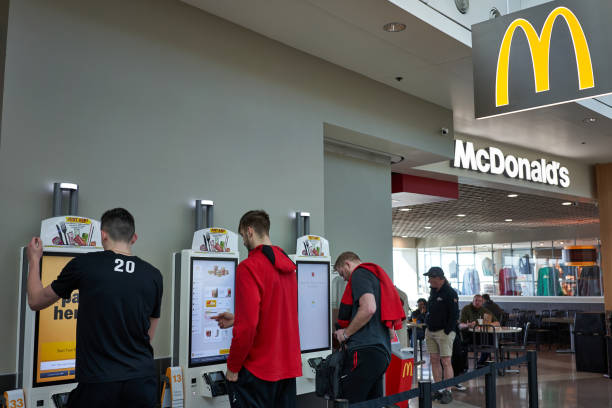
McDonald’s, a global fast-food giant, operates in over 100 countries, each with its own unique market dynamics and consumer preferences. To effectively manage its vast international operations, McDonald’s has established regional headquarters across different parts of the world. These regional hubs play a crucial role in ensuring that McDonald’s maintains its brand consistency while also adapting to local markets. This article explores the functions and significance of McDonald’s regional headquarters.
Key Functions of Regional Headquarters
1. Market Adaptation and Localization
One of the primary roles of McDonald’s regional headquarters is to adapt the brand’s global strategies to fit local markets. This involves:
- Menu Customization: Developing and introducing menu items that cater to regional tastes and dietary preferences. For example, the introduction of the McAloo Tikki in India and the Teriyaki McBurger in Japan.
- Cultural Sensitivity: Ensuring marketing campaigns and store designs reflect local cultures and traditions, making McDonald’s more relatable and appealing to local customers.
2. Operational Oversight
Regional headquarters oversee the daily operations of McDonald’s restaurants within their respective regions. This includes:
- Quality Control: Ensuring that all outlets adhere to McDonald’s stringent quality and safety standards.
- Supply Chain Management: Managing local supply chains to ensure a consistent supply of fresh ingredients and products.
- Employee Training: Providing comprehensive training programs for employees to maintain high service standards and operational efficiency.
3. Strategic Planning and Implementation
Regional headquarters are responsible for strategic planning and the implementation of corporate initiatives at the local level. This includes:
- Market Research: Conducting market research to understand consumer behavior and identify growth opportunities.
- Brand Management: Maintaining McDonald’s brand image and reputation through effective marketing and public relations strategies.
- Expansion Plans: Identifying potential new markets and overseeing the opening of new restaurants to drive regional growth.
4. Regulatory Compliance
Navigating the regulatory landscape is a critical function of regional headquarters. This involves:
- Local Regulations: Ensuring all operations comply with local laws and regulations, including food safety standards, labor laws, and advertising guidelines.
- Sustainability Initiatives: Implementing McDonald’s global sustainability initiatives in accordance with regional regulations and environmental policies.
5. Community Engagement and Corporate Social Responsibility (CSR)
Regional headquarters play a significant role in McDonald’s community engagement and CSR efforts. This includes:
- Local Partnerships: Collaborating with local organizations and charities to support community initiatives.
- Sustainability Projects: Leading regional sustainability projects, such as reducing waste, promoting recycling, and supporting local farmers.
- Educational Programs: Implementing educational and employment programs to support local communities and enhance McDonald’s reputation as a socially responsible brand.
Examples of Regional Headquarters and Their Impact
McDonald’s USA
McDonald’s USA, headquartered in Chicago, Illinois, is responsible for the brand’s operations in the United States. This regional headquarters focuses on:
- Innovation: Introducing new menu items and technologies to enhance the customer experience, such as mobile ordering and self-service kiosks.
- Sustainability: Implementing initiatives like sourcing sustainable beef and reducing greenhouse gas emissions.
- Community Support: Supporting local communities through programs like Ronald McDonald House Charities and various educational initiatives.
McDonald’s Europe
McDonald’s Europe, headquartered in Geneva, Switzerland, oversees operations in European countries. Key functions include:
- Menu Customization: Developing region-specific items, such as the McBaguette in France and the Big Rösti in Germany.
- Sustainability: Leading efforts to reduce plastic use and promote recycling across European markets.
- Regulatory Compliance: Ensuring adherence to the European Union’s stringent food safety and labor regulations.
McDonald’s Asia-Pacific, Middle East, and Africa (APMEA)
McDonald’s APMEA, headquartered in Singapore, manages operations in these diverse and rapidly growing markets. Focus areas include:
- Market Expansion: Identifying and entering new markets, such as the recent expansion into Vietnam and Kazakhstan.
- Cultural Sensitivity: Tailoring marketing campaigns and menu items to reflect local cultures and preferences.
- Digital Innovation: Leading digital transformation efforts, such as mobile app enhancements and delivery services, to meet the tech-savvy demands of these regions.
McDonald’s Latin America
Arcos Dorados, the largest McDonald’s franchisee in Latin America, headquartered in Buenos Aires, Argentina, oversees operations in the region. Key functions include:
- Community Engagement: Supporting local communities through educational programs and health initiatives.
- Sustainability: Implementing environmental initiatives, such as sustainable sourcing and waste reduction.
- Operational Excellence: Ensuring high standards of quality and service across all Latin American markets.
Conclusion
McDonald’s regional headquarters play a vital role in the company’s global success by adapting the brand’s strategies to fit local markets, overseeing operations, ensuring regulatory compliance, and engaging with local communities. These regional hubs enable McDonald’s to maintain its global brand consistency while effectively responding to regional market dynamics and consumer preferences. By leveraging the strengths of its regional headquarters, McDonald’s continues to thrive as a leading global fast-food brand.
FAQs
Q: What is the main function of McDonald’s regional headquarters?
A: The main functions include market adaptation, operational oversight, strategic planning, regulatory compliance, and community engagement to ensure McDonald’s global strategies are effectively implemented in local markets.
Q: How do regional headquarters help with menu customization?
A: Regional headquarters develop and introduce menu items that cater to local tastes and dietary preferences, ensuring that McDonald’s offerings are relevant and appealing to regional consumers.
Q: Why is regulatory compliance important for McDonald’s regional headquarters?
A: Regulatory compliance is crucial to ensure all operations adhere to local laws and regulations, maintaining McDonald’s reputation for quality and safety and avoiding legal issues.
Q: How do regional headquarters support McDonald’s sustainability efforts?
A: Regional headquarters implement McDonald’s global sustainability initiatives, such as reducing waste and promoting recycling, and lead regional projects that support local environmental policies.